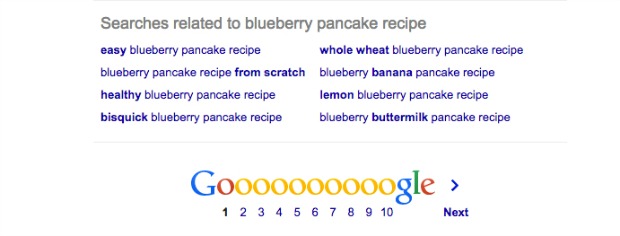Keywords are the bread and butter of SEO. When potential customers search for something in Google, you want your website to be in the top 3 results. Here’s how choose the best keywords to improve your SEO and increase your search ranking.

How Search Engines Work
Before we delve into the do’s and don’ts of keywords and SEO, it’s important to understand how search engines display results.
Google, Bing and other search engines use software — often referred to as “spiders” — to crawl and index the Internet. These spiders are constantly reviewing information and ranking it against similar content by relevance and popularity.
Say you run a food blog. Tomorrow you plan on posting your best recipe for blueberry pancakes with maple butter. When you publish your blog, Google’s spiders will index your post based on the relevant keywords: blueberry, pancake, maple, butter, recipe, etc.

When someone searches for “blueberry pancake recipe,” Google will recognize that your blog is relevant to those search terms and display it in the results. SEO helps you move to the top of those search results.
SEO in a Nutshell
Search engine optimization isn’t very complicated. Sure, some people will try to impress you with new tricks for the latest algorithm changes to Google. But you don’t need an expert to optimize your website.
A few simple strategies will get you 98% of the way there. If you’re very competitive (and have lots of time on your hands) some fancy SEO strategies may be helpful. For most of you — especially if you’re new to optimization — it’s best to stick with the basics.
SEO essentially comes down to 2 strategic principles:
- Choosing the best keywords. What are your potential customers searching for?
- Signaling the search engines. Helping Google connect your website to those keywords.
Use the do’s and don’ts below to choose the best keywords for your site.
1. Do Check Out the Competition
Take your top 3 competitors and visit their websites. Read the landing pages and blog posts. What topics do they focus on? What keywords do you see over and over?
Do a quick Google search for those keywords. Does their website show up on the first page of the search results? What about your website? If you both rank high in certain keyword searches, it could be an opportunity to steal some market share.
2. Do Keyword Research
Keyword research will put you on the right track for optimizing your website. If you choose the wrong keywords, you won’t be able to connect potential customers with your brand.
Create a list of topics related to your business. A good place to start is the topics you regularly blog about. For food blogs, it may be recipes, celebrity chefs and kitchen accessories.
Use the topics you’ve selected to brainstorm specific keywords. Write down a long list of potential words and phrases to use. Some search terms related to recipes might include: “quick dinner recipes for two,” “5-minute meals” and “healthy recipes for kids.” Jot down everything you think of. You can trim down your list later.
3. Don’t Use Generic Keywords
Choose phrases over words. Remember, keywords don’t have to be just one word. Ranking high in the search results for “food” will be an uphill battle because it’s so competitive. There are a lot of food blogs. Instead, focus on phrases like “quick and easy dinner recipes.”
Look for related search terms. Search for one of your keywords in Google. Scroll down to the bottom of the page to view related searches. Then add those to your list of keywords.

4. Don’t Miss Out on Local Opportunities
Use region-specific keywords to let Google know where your business is located and help potential customers in your area find you. Adding your city and state to your keyword choices and listing your physical address tell Google that you serve a localized market.
5. Don’t Rely on Your Intuition
Test your keyword choices. Google’s Adwords Keyword Planner will help you narrow down your list based on quantitative data. If you want to capture customers quickly, check out Google Trends. It will show you which keywords are growing in popularity and help you ride the initial wave.




No comments:
Post a Comment
share your thoughts with us